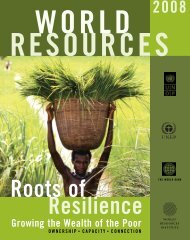jp8589 WRI.qxd - World Resources Institute
jp8589 WRI.qxd - World Resources Institute
jp8589 WRI.qxd - World Resources Institute
Create successful ePaper yourself
Turn your PDF publications into a flip-book with our unique Google optimized e-Paper software.
CHAPTER 3<br />
THE ROLE OF GOVERNANCE<br />
Insecure tenure translates to a lack of assurance that one’s<br />
land or resource rights will be respected over time (Meinzen-<br />
Dick et al. 2002:1). In many countries of Southeast Asia, for<br />
example, long-term forest dwellers such as indigenous peoples<br />
and local farmers often have de facto access to forests, but their<br />
tenurial control over trees, timber, and the right to manage forest<br />
uses is often limited in scope and unrecognized in law (Lynch<br />
and Talbott 1995:29). For instance, the traditional system of<br />
forest tenure (called adat) recognized by many forest dwellers in<br />
Indonesia has often been ignored by the government, which<br />
asserts legal ownership of all forest areas in spite of customary or<br />
historic uses (<strong>WRI</strong> et al. 2000:36-37).<br />
In addition, the ability of the rural poor to participate in<br />
political decisions that affect their livelihoods often is limited by<br />
the power of other, more politically connected, parties with an<br />
interest in the same resources. Government agencies, corporations,<br />
large landowners, poor farmers, indigenous peoples, and<br />
different ethnic or cultural groups frequently make overlapping<br />
and conflicting claims on the same set of natural resources.<br />
Unfortunately, unless the tenure rights of the poor are secure,<br />
they usually lose out in these conflicts over competing claims<br />
(Alden Wily 2004:5).<br />
While many forms of resource tenure are important, land<br />
tenure—rights over the land itself—is often the most fundamental<br />
building block of prosperity for the poor (Deininger et al.<br />
2003:5). That is because land rights underpin most other<br />
resource rights, with the exception of offshore marine resources.<br />
Without secure land tenure, it is difficult to conceive of the poor<br />
being able to generate wealth from nature.<br />
Tenure Security and Environmental Investment<br />
Security of tenure exerts tremendous influence on how land and<br />
resources are used. Secure tenure can be defined as the certainty<br />
that a person’s rights to continuous use of land or resources will<br />
be recognized and protected against challenges from individuals<br />
or the state. This kind of certainty provides an incentive to make<br />
long-term investments in maintaining or enhancing the productivity<br />
of that property. For instance, a person with the right to use<br />
an agricultural field for decades or a lifetime may invest in an<br />
irrigation system whereas a farmer leasing a field for only a year<br />
will not (Bruce 1998a:2).<br />
When insecurity of tenure acts as a disincentive to longterm<br />
investments in soil conservation, irrigation, and the like,<br />
land quality can deteriorate and agricultural productivity<br />
suffer. For this reason, tenure reform is frequently a component<br />
of development projects aimed at enhancing food security and<br />
sustainable livelihoods for the rural poor. Tenure reform is<br />
distinct from land reform in that it does not redistribute parcels<br />
of land per se, but rather makes adjustments in the rights to<br />
hold and use land. Examples of land tenure reforms include<br />
strengthening informal tenure rights by making them legally<br />
enforceable and transforming state-issued permits for specific<br />
land uses into leases that provide more protection for users of<br />
the land (FAO 2002:20).<br />
Continues on page 59<br />
57

















